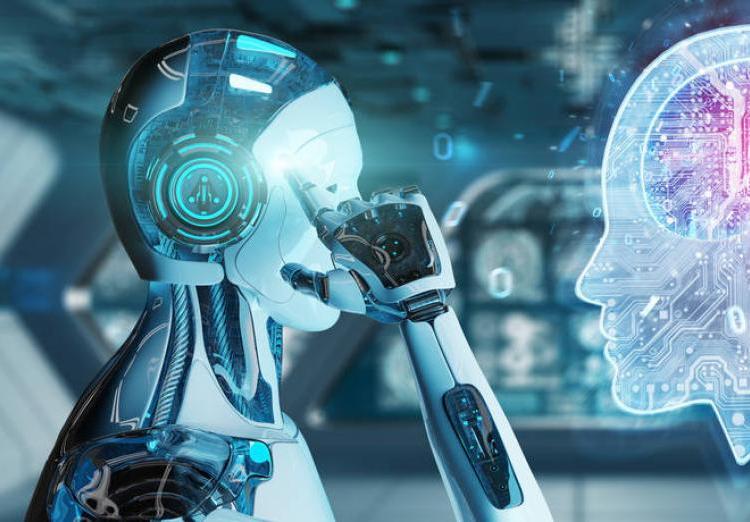AI is rapidly being utilized across various sectors to enhance productivity. With its generative capabilities, AI is transforming workflows, improving efficiency, and creating new business applications. Let’s explore the different ways generative AI is expected to impact productivity in the near future and how you can leverage its benefits in your work.

AI Enhances Workflows
Business professionals are constantly seeking ways to simplify and optimize their workflows, leading to increased productivity. Generative AI plays a crucial role in adapting and complementing new workflows, relieving employees from repetitive tasks. Its adaptive nature enables it to seamlessly integrate into workflows across diverse sectors.
For instance, generative AI can streamline data analytics by rapidly processing large datasets and providing faster insights. This capability has significant applications across industries. In marketing, generative AI can analyze customer behavior patterns and predict their response to new products or services. In the cybersecurity domain, generative AI algorithms can evaluate historical event data to help identify potential security threats. However, the extent to which AI can enhance cybersecurity is still a subject of debate.
As generative AI continues to advance, it holds the potential to revolutionize various aspects of workflows, allowing businesses to optimize their processes and achieve higher levels of productivity.
Automation of High-Level and Complex Tasks
Recent research conducted by Goldman Sachs has revealed that AI has the potential to automate approximately two-thirds of professions in the United States. This means that a significant portion, ranging from a quarter to half, of the workload in those occupations could be replaced by AI.
While the impact of AI on the labor market is expected to be significant, it’s important to note that most careers and industries will experience partial susceptibility to automation rather than complete substitution. AI is more likely to complement existing workflows rather than fully replace human workers.
Generative AI, with its advanced ability to comprehend historical patterns and contextual information, summarize complex data, employ predictive intelligence, and suggest optimal actions, will usher in a new era of personalized and highly efficient experiences. It has the potential to automate even more intricate tasks and elevate business process automation to new heights.
By leveraging generative AI, businesses can streamline complex decision-making processes, enhance productivity, and achieve a higher level of operational efficiency. It opens up opportunities for personalized customer experiences and empowers professionals to focus on higher-level strategic initiatives that require human expertise and creativity.
As generative AI continues to advance and integrate into various industries, its automation capabilities will revolutionize how tasks are performed, leading to significant improvements in productivity and overall business performance.
Achieve More in Less Time
Generative AI possesses the ability to automate processes that typically demand creative input from humans. This has the potential to save businesses both time and money while delivering high-quality results.
By enabling individuals to work at a much faster pace, it is reasonable to anticipate a reduction in the number of hours required for certain jobs, resulting in shorter workdays. AI is already being leveraged to streamline remote and hybrid work arrangements, revolutionizing how work is conducted.
As companies progressively adopt automation and human capital becomes less indispensable, new methods of measuring productivity will emerge. While human intervention will still be necessary in conjunction with AI, employees across various industries may find themselves working fewer hours.
This shift towards shorter work hours can bring about a range of benefits. Employees will have more time for personal pursuits, achieving work-life balance, and engaging in professional development. Furthermore, reduced working hours can lead to increased job satisfaction, improved well-being, and enhanced productivity during the time spent on tasks.
However, it is important to note that the impact of generative AI on work hours will vary across industries and job roles. Some positions may still require extensive human involvement, while others may experience more significant reductions in working hours.
Overall, the integration of generative AI technologies holds the potential to transform the way work is structured and executed. By harnessing the power of automation, businesses can accomplish more in less time, optimize resource allocation, and create a more efficient and balanced work environment.
Limited Impact on High-Skilled Workers
A recent study conducted by the National Bureau of Economic Research and MIT indicates that the greatest beneficiaries of AI advancements are likely to be low-skilled employees. As generative AI continues to automate tasks and gain a deeper understanding of context, individuals in low-skilled and mid-skilled positions stand to gain the most.
On the other hand, high-skilled jobs that involve complex skills and significant human intervention may experience minimal assistance from AI. This is because AI recommendations are based on existing knowledge and repetitive actions, providing limited support to high-skilled workers and resulting in minimal impact on their roles.
Workers with advanced expertise are unlikely to derive substantial benefits from AI integration. This is due to their ability to produce outputs of equal or higher quality compared to AI recommendations, leaving little room for improvement or development.
To maximize your productivity in an AI-driven landscape, it is crucial to embrace continuous upskilling in areas where AI has yet to reach its full potential. By focusing on developing skills that are complementary to generative AI, you can enhance your professional relevance and thrive in a changing job market.
Embracing a mindset of lifelong learning and adaptability will be key to navigating the evolving landscape of work. By identifying areas where human judgment, creativity, and critical thinking still hold a competitive edge over AI, high-skilled workers can position themselves for continued success and maintain their value in the workforce.
In conclusion, while generative AI is set to have a significant impact on the employment market, its influence will vary across different job roles. By recognizing the limitations of AI in high-skilled domains and proactively seeking opportunities to enhance one’s skill set, individuals can effectively harness the potential of generative AI and secure their productivity and relevance in the future.


